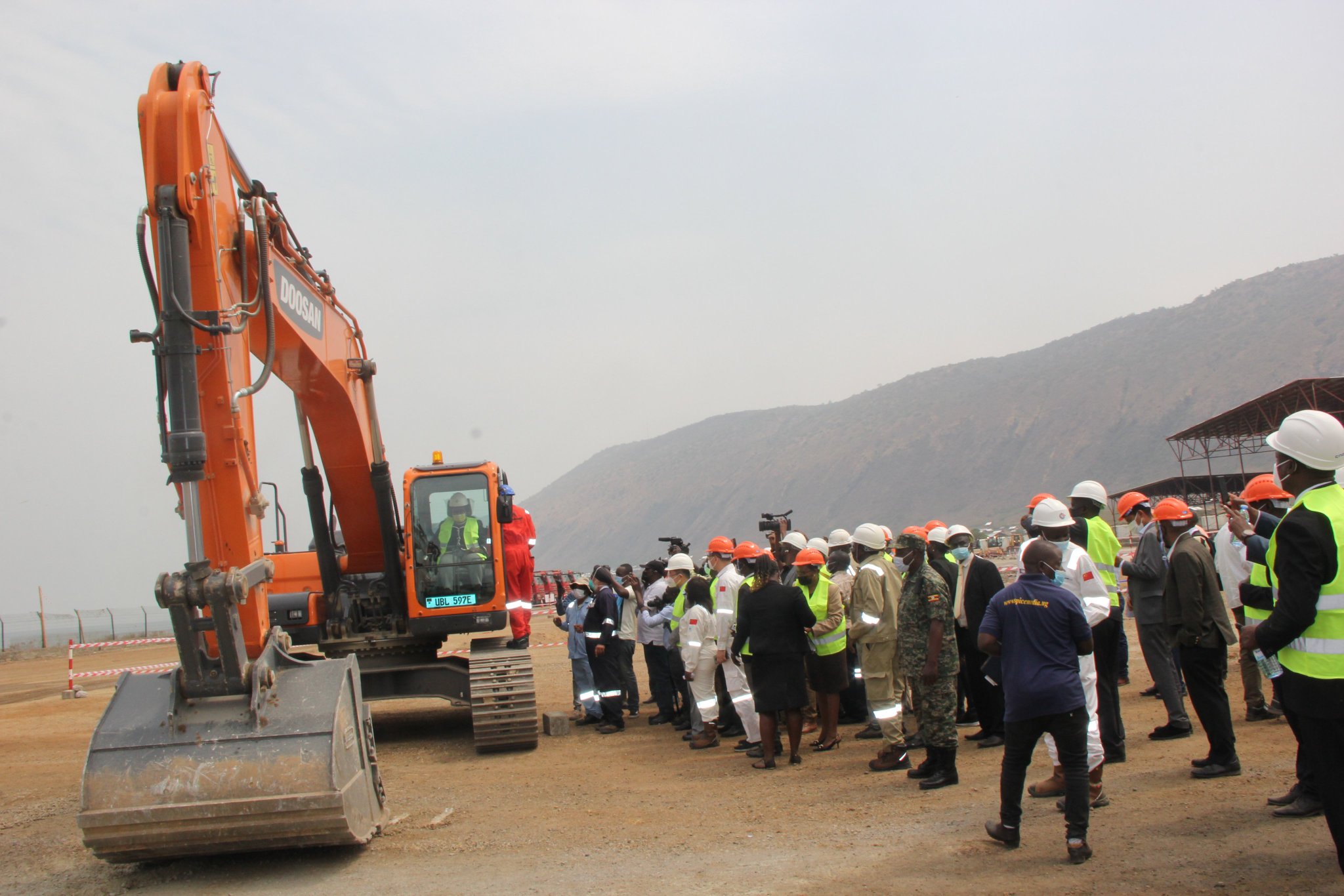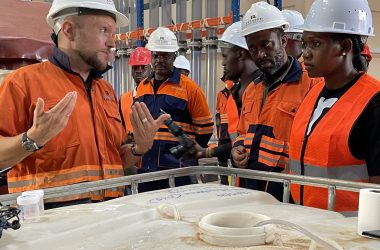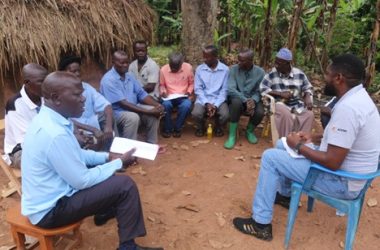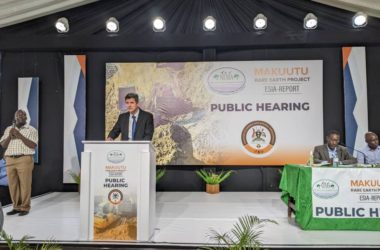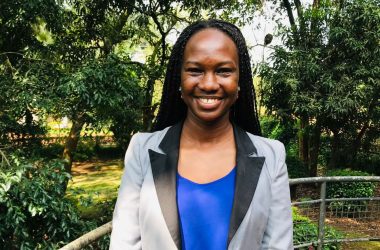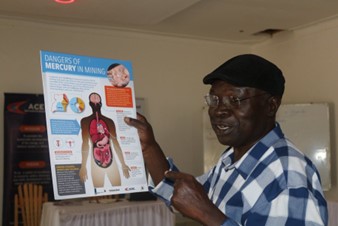As Uganda enters the development phase of the oil and gas sector, expectations are high among the populace as to how they will benefit. Below we reproduce excerpts from a talk show where Peter Muliisa, the Chief legal and Cooperate affairs for UNOC, and Henry Bazira, Executive Director Water Governance Institute, break down the meaning of the recently FID in regard to what Ugandans should expect.
What does the FID mean?
Peter Muliisa: The FID was announced 1st February 2022 by TotalEnergies & CNOOC, as well as UNOC. FID means that the companies participating in oil & gas have committed the relevant funds to construct the facilities required to get oil out of the ground. The upstream actors are TotalEnergies, CNOOC and UNOC. Upstream involves exploration, development and production of oil & gas. Because we’re landlocked, we needed to find a route to evacuate the oil and link it to the international market. As such, we had to construct a pipeline. As the upstream actors, we have provided the funds for extraction. This is what FID is for the upstream segment.
The pipeline is owned by UNOC, our equivalent in Tanzania called Tanzania Petroleum Development Corporation (TPDC), CNOOC and Total. To build the pipeline, we are looking at USD 3.8 billion and the entities going to own the pipeline need to bring that money. What FID means is we have committed that money.
To a lot of Ugandans, this means a lot of opportunities because the Tilenga and Kingfisher projects where the crude oil is going to be extracted from are going to cost us upwards of USD 7 billion to develop, and that money is going to be spent in the next four (4) years of construction.
EACOP is going to cost USD 3.8 billion, summing up to about 11 USD billion that is going to be spent in developing the facilities required and then transporting the crude oil through Tanzania to the port of Tanga.
This is a big opportunity for Ugandans because this money is going to be spent on procurement of goods and services. So we are going to have people working in the fields who are going to need food and other services; security, transport among others. The other category of goods required like oil pipes may be beyond Ugandans to provide; but, basically we are to spend USD 11 billion that going on goods and services. To an ordinary Ugandan there is a real opportunity to tap into this investment.
What are the implications of this announcement?
Henry Bazira: This announcement gives us confidence that the exploration process we started 16 years ago has become a reality and that the oil is finally going to come out of the ground. All this infrastructure that Peter is talking about would not have happened if not for the FID.
While the opportunities are real, the challenge is the actual management of how those opportunities come to Ugandans because we have a local content law whose development I am glad to have been a part of. I am also glad as a member of Civil Society Coalition for Oil and Gas, to have been part of the development of Uganda’s petroleum laws. All of them, upstream, midstream and now we are looking at a situation where we can contribute to the downstream so that Ugandans can get cheap fuel.
This opportunity also allows Uganda to be able to use its own oil. We hope Government can make this possible, because it is possible. We can actually reduce our imports of oil, and have some of the oil that we’re spending in Uganda actually be consumed by Ugandans so that we don’t get a situation where the oil produced in Uganda is more expensive than the oil that is imported.
I am looking at a great opportunity not only for people who are working in the upstream section of the petroleum value chain, or the midstream where there is a pipeline and the refinery, but it triggering a whole host of industries. Accompanying this development, there are many industries that are going to emerge.
For example, the tar that comes off the oil will be used for the construction of roads. So we don’t have to go and import tar. We are going to have shoe polish; our pharmaceuticals will get some of the raw materials from here. We are going to have paint being processed from here. So that gives us a big host of job opportunities. One barrel of oil can trigger about 44 industries. So if we can have those industries, and have a framework in Government that allows these industries emerge, Uganda will not be a poor country as we are today.
What are the milestones that you think Government should put more emphasis on for Ugandans to tap into?
Henry Bazira: Many Ugandans do not have the experience that would have been required in the industry. The only way Government and UNOC can help us is to help our local people; the engineers, caterers, the logistical services (clearing and forwarding), welders among others, to gain the skill acceptable within the oil company standards, so that they do not choose to solicit services abroad because of lack of capacity in Uganda.
Secondly, acquire the technology. I like what the Ministry of Energy is doing. They are preparing Uganda through UNOC to actually enter the exploitation of natural resources so that we reduce our dependence on foreign companies to exploit our natural resources. I’m hoping that along the way, UNOC can actually acquire the technology to exploit the resource to also compete for oil fields just like Tullow Oil, Total and the rest. I would like to see more growth in the way UNOC is involved in the business. I wish it could be bigger, that they are able to have petrol stations, and that their fuel is dependable and trustable by Ugandans. What will make us arrive at these milestones is deliberate and committed actions towards these milestones. We have a good professional team both in Government and UNOC, who should be able to lead us to this point. Let the technical people do what they are supposed to do. I am confident that we have a team that can make the petroleum sector turn around.
At what point will the opportunities be available for Ugandans to utilise?
Peter Muliisa: The key timeline was setting the FID. That basically sets off the contracting of sub-contractors who are going to construct these facilities, and most of the level one contracts are on Conditional Letters of Award. Most of the work has started especially early civil works. If you go to Buliisa where the central processing facility is going to sit, we have cleared the land, so civil works are ongoing. There are probably about six (6) companies that are working there. In Kingfisher, you must have watched the launch on civil works.
The next milestones are to ensure that the construction and first oil timelines are achieved. We hope to produce the first barrel in the first quarter of 2025. For Ugandans, the period of interest should be between now and 2025 when the opportunities are available for people to provide goods and services as well as expertise (advisory services of any nature-legal, accounting etc).
The USD 11 billion is just on investment, without considering the refinery which is another project that we are developing. If you add the refinery, the investment is about USD 15 billion. That’s a lot of money for an economy of USD 41 billion and it brings a lot of opportunity for Ugandans.
How do Ugandans participate?
What we have done under our legal regime is create a preference for Ugandans in procurement for goods and services. For goods that we do not have, a foreign supplier will be able to bring them in. But for the goods that are available here, Ugandans have priority in the procurement. So all Ugandans need to do is to mobilise themselves, create strong joint ventures among themselves so that they can bid together and be strong.
Ugandans have priority over any supplier and will be given contracts on a first priority basis. That allows us to retain a part of this USD 15 billion in the country, so that it creates a multiplier effect within the economy as well, and creates a value chain around it. When people earn income they invest it and once they invest it, a multiplier effect is created which creates more jobs. That’s what we want to see.
Out of all the required services, we have ring fenced about twenty one (21), that we believe Ugandans can supply. Even for those that are not ring fenced, we encourage Ugandans to compete, because the law gives us priority even for these.
You can participate as an individual, company or partnership. Even if you have just registered a name, as long as it is a legal structure, you can bid. What we have done, through PAU, is to create a National Supplier’s Database to know every Ugandan interested and capable of providing services. So we require that entities, individuals, business names, partnerships are registered on the National Supplier Database. This is important because when an advert goes out for a service and the oil companies evaluate, and may be say the service is not available in Uganda, we are able to go into the supplier database and see if there are any companies offering the service.
For international companies that are supplying goods and services, we encourage joint ventures with local companies. It is easier for them to go to NSD and identify companies they can joint venture with. It also helps the Government through PAU to regulate and make sure Ugandans are being given priority.
Registration on the NSD is an easy process that can be done on online. Also, build a look out for the opportunities that come out in the press, come to our offices and ask us questions. We are happy to guide and educate on how to participate.
What are the public perceptions and theories about Uganda’s oil and gas?
Henry Bazira: The public perception about how contracts are awarded is that the bidding is selective, even where the contracts require competitive bidding. I mean, even at the point of bidding, there is a pre-selected company that will take the bid. Yes, there are ring fenced opportunities, but people believe they will be taken by a small group of people.
So when you talk about transparency and accountability, this is where it should be targeted. We say, let there be a fair ground for everyone to compete so that when one fails, they know they did not fail just because someone else was favoured to take the deals.
Today, people still ask themselves how these services are awarded. We are seeing people in logistics, catering etc, but was there a competitive biding process? If it was there, how many people understood that? Or is it that those people who are privy to the knowledge run for the contract. What if you find that even those who have the capacity are dismissed because there was some favouritism for a specific company? People are reluctant to apply because of the belief that some people have already been chosen to take on these services.
There are segments of Ugandans out there who are saying that the oil was sold a long time ago and the money was already spent. The narrative is, we have highly indebted ourselves, and therefore indirectly mortgaged the oil. The other perception is much as the oil is still in the ground, the people they sold it to will take it away. So these are perceptions the Government needs to address.
Government is not clearly coming out to speak on these issues and this creates fertile ground for perceptions and conspiracy theories.
How do we demystify and address these perceptions?
Peter Muliisa: I am personally involved in some of these procurements. As UNOC, we approve some procurements and I can confirm to all Ugandans that all procurements, especially the ones for level one, and all the others are competed for and evaluation is very strict because oil & gas is such a sensitive, high risk industry. There is no chance of choosing an entity that is incapable of providing a service, because the wrong service could cost us all this money that we are investing. There is an absolute high level of transparency for companies that are running the bids. There is a review that happens between us the oil Companies (CNOOC, UNOC, TotalEnergies) and the Petroleum Authority of Uganda has to approve each and every contract. Their role is to check whether the procurement process has followed the set guidelines and laws. I can assure you that the checks are there, and the intention is to get the best to supply the industry because it is high risk, we cannot afford to get sub-standard services.
So I want to encourage Ugandans to go in without pessimism. The reality is that the sector is competitive, and if you are good, you will get the bid job. If you can’t get the bid job, we have a process where we announce the bundle of contracts to ensure that you can take the small element that you’re able to provide. I want to assure Ugandans that there is an opportunity for everybody and it is an equal playing field.
On whether the oil has been taken, I have seen these allegations on social media and they are easy to respond to. When out of the ground, the crude oil is like shoe polish because it is highly waxy. You need to heat it to move it. And so there is no possibility of getting crude oil through trucks and tanks. The only way we shall evacuate this oil is through the pipeline because it is heated. So I want to assure Ugandans that the oil is still in the ground. It will start coming out in 2025 and will be transported through the pipeline to Tanga and through the pipeline to the refinery that we are going to build.
The refinery will produce products that we now import. Around the refinery we have created the Kabale Industrial Park that will utilise the products of the refinery to spur the petrochemical industry that will create a lot of jobs, supply chains, and support our exports.
The oil is structured to be used very well. The laws that we have require that all the revenues in oil and gas go into a particular fund, not the consolidated fund where we put all our tax revenues as a state, but a particular fund. To get that money out of the fund, you require appropriation by parliament, and it can only be appropriated for two purposes namely; to support an investment fund for the future generation and infrastructure development.
Money from this fund cannot be used for consumption of anything like maybe salaries for Government employees. It is strictly for infrastructure and investment. Infrastructure development is important because it will help everybody access the market, make it easy to transport goods to the market, move from one place to another. So the industry is structured in a manner that it is created for the benefit of Ugandans and the oil will be extracted in a manner that is sustainable.
I want to encourage Ugandans to apply. There are many Ugandans who have already won contracts and are doing big things. Do not lose this benefit in pessimism.
I also want to address the point on complexity about national database registration. We have tried as much as possible to make it easy. If there are any complications, walk to our offices on Yusuf Lule road, plot 15, go to PAU offices and explain your complication. We will manage it. We have teams of PAU and UNOC in the Albertine Graben, registering all entities that want to be on the NSD. We are working with URA, NSSF, and Uganda Investment Authority, to ensure that those people are helped.
What has been done to mitigate the oil and gas impacts on the environment?
Oil and gas is sensitive about the environment because we know the danger it can have. For each of the projects (Tilenga, Kingfisher, EACOP), we have done an Environmental Impact Assessment. There is an extensive study on the impact of environment and social impact on the people and have worked out mitigation measures.
We have also ensured the ESIAs are public, are discussed with CSOs, international players, community itself, districts and we pick views, adjust the report to accommodate all comments and submit it to NEMA. NEMA reviews them and if it satisfied they are approved. So what we can confirm to the public is that the environment will not be affected.
The pipeline for example is going to be buried, monitored very well and we have put in place all interventions to ensure that there is no chance of leakage. Most people will not even know where it passes because we shall put vegetation on top. Our environmental laws are quite stringent. We do not permit flaring. This is basically burning oil that is unnecessary and this tends to pollute the environment. In Uganda it is illegal. We have followed the most stringent standards in managing our environmental and social impacts and we believe that using these international standards that have been audited by third parties, will be effective in protecting the environment.
On the issue of the compensation system
Henry Bazira: The compensation they are giving is not leaving citizens better off than they found them. The compensation framework has taken away capital from people and not given them shares of their land. I would like to see a situation where the PAPs (Project Affected Persons) have shares of production because they have given in their capital (land).
We need to know whether the interventions we are giving them are putting them where we would want them to be, or if they are falling into deeper poverty. I would like a situation where Government does a survey to assess perception of the industry which would inform the messaging of intervention because I know even today, there are PAPs complaining. Some of them have gone to court.
Secondly, the grievance mechanism is controlled by the oil companies. You cannot be the offender, jury and executioner. We need a grievance mechanism that is independent of this process. There have been cases of people being told by government security that even if they don’t take the money, their land will still be taken. That’s not proper!
Where do oil companies stand on compensation?
The compensation is a constitutional matter. The constitution requires that there is adequate and prompt payment for land. There is a process for valuation of land. The project is buying land for development and it is only fair that it buys that land at market value. We get this value through a Chief Government Valuer, who goes to the field and values the land and developments on it.
We have even added additional charges for disturbance allowance so we are paying much higher fees than what we would have paid for compensation.
If a PAP feels the Chief Government Valuer’s figures are lower than what they were paid, they are allowed to have a private valuer, and then it is determined later on which value goes. It is important for values to be well structured. If we value for instance a plant at UGX 20,000 and for oil & gas we say we are able to pay UGX200, 000, this becomes the value in that area. So if such a person’s neighbors’ cow destroyed their plant, they would also have to be compensated at the same rate. This is why the rates must be actual because they are going to apply even beyond the project.
What we have done as a project is to ensure every PAP goes through financial literacy training to guide them on what to do with their money. It is a long process that we have involve banks in. This is to make sure the PAPs are in a much better state than they were before the project. We have a compilation of testimonies of people who have got better houses and are doing better. As I conclude, I want to assure Ugandans that what we want, is to leave the PAPs better than we found them.

